- 相關(guān)推薦
用英語(yǔ)表示春節(jié)手抄報(bào)內(nèi)容
一、春節(jié)的英文叫什么?:
用英語(yǔ)表示春節(jié)手抄報(bào)內(nèi)容
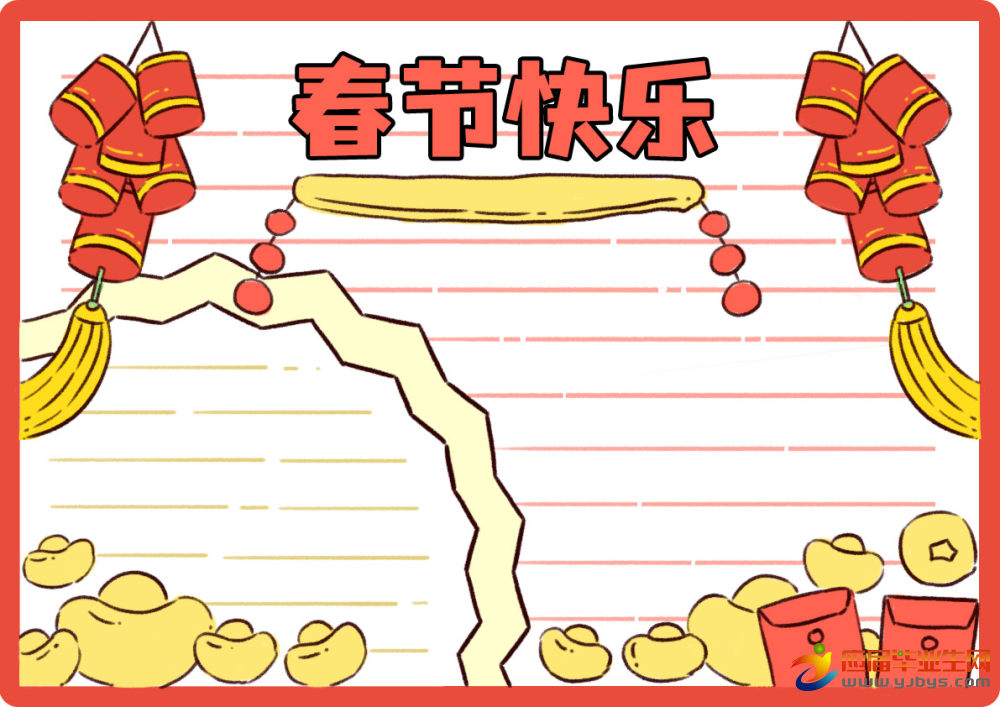
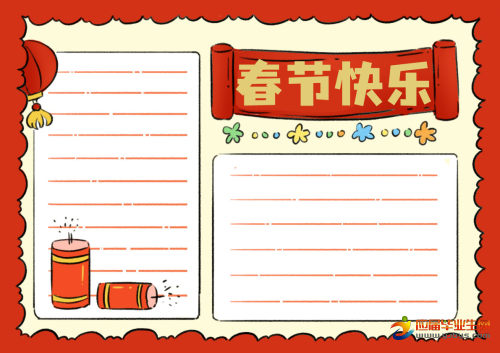
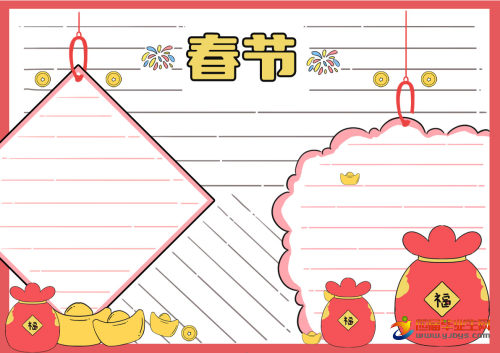
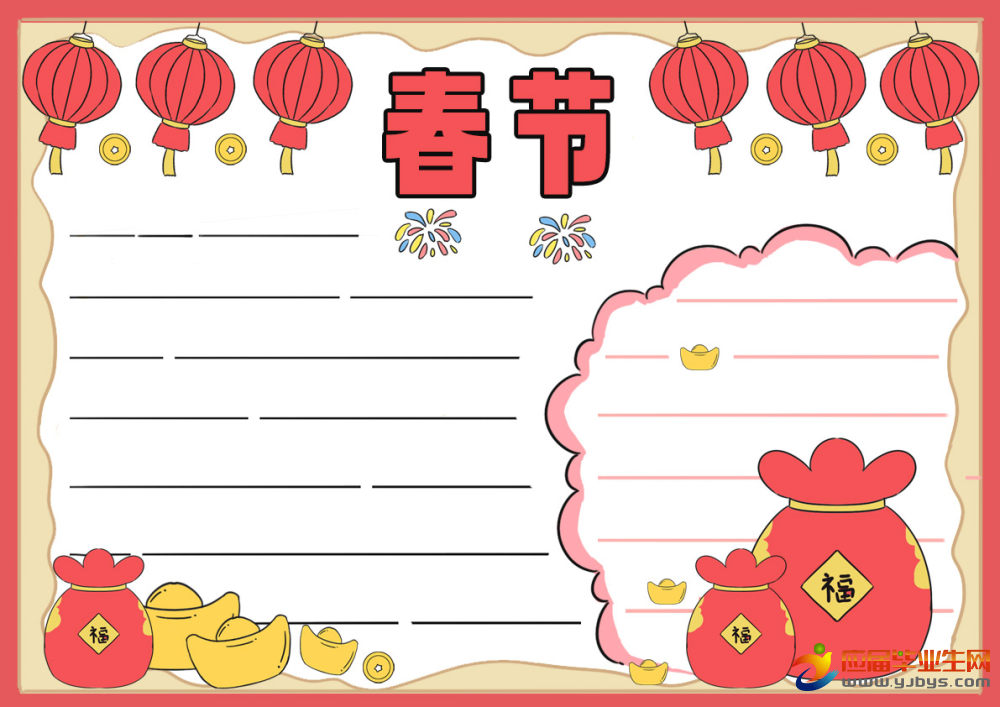
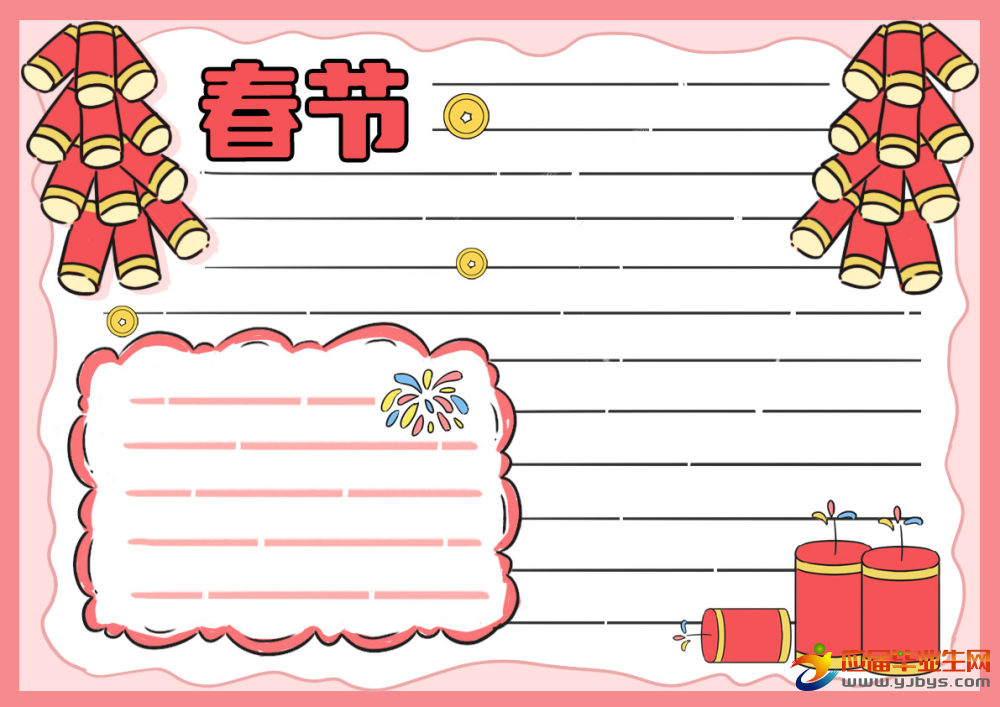
the Spring Festival!
二、春節(jié)英文怎么介紹:
The Spring Festival is the most important festival in China.People usually decorate the doors and windows with red papercuts.becouse red means good luck.People usually clean house too.becouse they want to sweep away bad luck.Children can get some new clothes or presents from their parents and grandparents.
On New Year's Eve,family always have a big dinner.Everybody are watch TV and talk.In the midnight,there usually fairworks.
On New Year's Day,people usually put on their new clothes and visit their femily and friends.They usually say:"Happy New Year's Day."
The Spring Festival finishes at the Lantern Festival after two weeks.People usually eat a kind of rice dumpling called yuanxiao.It can take people good luck all the year round.
三、中國(guó)春節(jié)的來(lái)歷
The Origin of Chinese New Year
The Chinese New Year is now popularly known as the Spring Festival because it starts from the Begining of Spring (the first of the twenty-four terms in coodination with the changes of Nature). Its origin is too old to be traced. Several explanations are hanging around. All agree, however, that the word Nian, which in modern Chinese solely means "year", was originally the name of a monster beast that started to prey on people the night before the beginning of a new year.
One legend goes that the beast Nian had a very big mouth that would swallow a great many people with one bite. People were very scared. One day, an old man came to their rescue, offering to subdue Nian. To Nian he said, "I hear say that you are very capable, but can you swallow the other beasts of prey on earth instead of people who are by no means of your worthy opponents?" So, it did swallow many of the beasts of prey on earth that also harrassed people and their domestic animals from time to time.
After that, the old man disappeared riding the beast Nian. He turned out to be an immortal god. Now that Nian is gone and other beasts of prey are also scared into forests, people begin to enjoy their peaceful life. Before the old man left, he had told people to put up red paper decorations on their windows and doors at each year's end to scare away Nian in case it sneaked back again, because red is the color the beast feared the most.
From then on, the tradition of observing the conquest of Nian is carried on from generation to generation. The term "Guo Nian", which may mean "Survive the Nian" becomes today "Celebrate the (New) Year" as the word "guo" in Chinese having both the meaning of "pass-over" and "observe". The custom of putting up red paper and firing fire-crackers to scare away Nian should it have a chance to run loose is still around. However, people today have long forgotten why they are doing all this, except that they feel the color and the sound add to the excitement of the celebration.
四、中國(guó)春節(jié)的內(nèi)容:
1.
I like the Chinese new year better than any other festival. This is a time especially for rest and joy. I need not study. I wear good clothes and eat good food. I have a good time from morning till night. I am as happy as a king.
我喜歡中國(guó)新年比喜歡其它任何節(jié)日更甚。這是一個(gè)專為休息和歡樂(lè)的時(shí)間。我不需要讀書(shū)。我穿好衣服,吃好東西。我每天從早到晚日子過(guò)得輕松愉快。我和上帝一樣快樂(lè)。
2.
春節(jié)是中國(guó)民間最隆重的傳統(tǒng)節(jié)日。在夏歷正月初一,又叫陰歷年,俗稱“過(guò)年”、“新年”。春節(jié)的歷史很悠久,它起源于殷商時(shí)期年頭歲尾的祭神祭祖活動(dòng)。按照我國(guó)農(nóng)歷,正月 初一古稱元日、元辰、元正、元朔、元旦等,俗稱年初一,到了民國(guó)時(shí)期,改用公歷,公歷的.一月一日稱為元旦,把農(nóng)歷的一月一日叫春節(jié)。
Lunar New Year , the most solemn of traditional Chinese folk festivals. First day of the first lunar month in the traditional Chinese lunar calendar, known as the Moon, commonly known as "New Year" and "New Year." The long history of the Spring Festival, which originated in the Shang period the year draws to a close servicemen and the memorial activities. According to China's Lunar, the first day of the first lunar month yen ancient name, Yuan-chen, a copy, is Emperor, the New Year Day, which is commonly known as Day of the Republic. switch to the Gregorian calendar, the calendar on January 1 as New Year's Day, January 1st called the Lunar Spring Festival.
3.
Spring festival is coming.Spring Festival is on the traditional Chinese festivals.People used to call it "the Lunar New Year".It always starts between january the first and february the twentieth.
Shortly before the festival ,Chinese people are busy shopping . They buy vegetables,fish,meat and new clothes and many other things.They clean the houses and decorate them.
春節(jié)到了,春節(jié)是中國(guó)的傳統(tǒng)節(jié)日,人們習(xí)慣上成作農(nóng)歷年.這個(gè)節(jié)日總是在每年的一月初到二月中旬之間.
春節(jié)前的一段日子,中國(guó)人早早地開(kāi)始買年貨.他們買蔬菜.魚(yú)和肉.新衣服和種種其他的東西.他們打掃房屋,把自己的家布置一新.
4.
The Chinese New Year is a festival whose Chinese are most important.The history of the Chinese New Year is very long.Stanza front stick in an on the face the New Year's Day of the implied meaning of the yellow word in red paper in top send message by word and the god of wealth resembles with hang deep red lantern etc.. The Chinese New Year is a close relatives the festival of the family reunion.The not far a long distance in child that leave the house returns to the home.The family rounds to sit together a dumpling, use the dumpling symbol family reunion.The beginning of January is on thering is fiesta cooking stove etc. rites before;In the stanza make New Year's visit the child New Year's Money, friend etc.
春節(jié)是漢族最重要的節(jié)日。春節(jié)的歷史很悠久。節(jié)前就在門臉上貼上紅紙黃字的寓意的新年寄語(yǔ)及財(cái)神像和掛大紅燈籠等. 春節(jié)是個(gè)親人團(tuán)聚的節(jié)日。離家的孩子不遠(yuǎn)千里回到家里。家人圍坐在一起包餃子,用餃子象征團(tuán)聚。正月初一前有祭灶等儀式;節(jié)中有給兒童壓歲錢、親朋好友拜年等.
【用英語(yǔ)表示春節(jié)手抄報(bào)內(nèi)容】相關(guān)文章:
英語(yǔ)春節(jié)手抄報(bào)內(nèi)容01-31
春節(jié)英語(yǔ)手抄報(bào)內(nèi)容06-19
春節(jié)手抄報(bào)英語(yǔ)的內(nèi)容06-20
春節(jié)的英語(yǔ)手抄報(bào)內(nèi)容09-04
英語(yǔ)內(nèi)容春節(jié)手抄報(bào)08-24
2015春節(jié)英語(yǔ)手抄報(bào)內(nèi)容06-29
春節(jié)英語(yǔ)手抄報(bào)內(nèi)容資料07-05